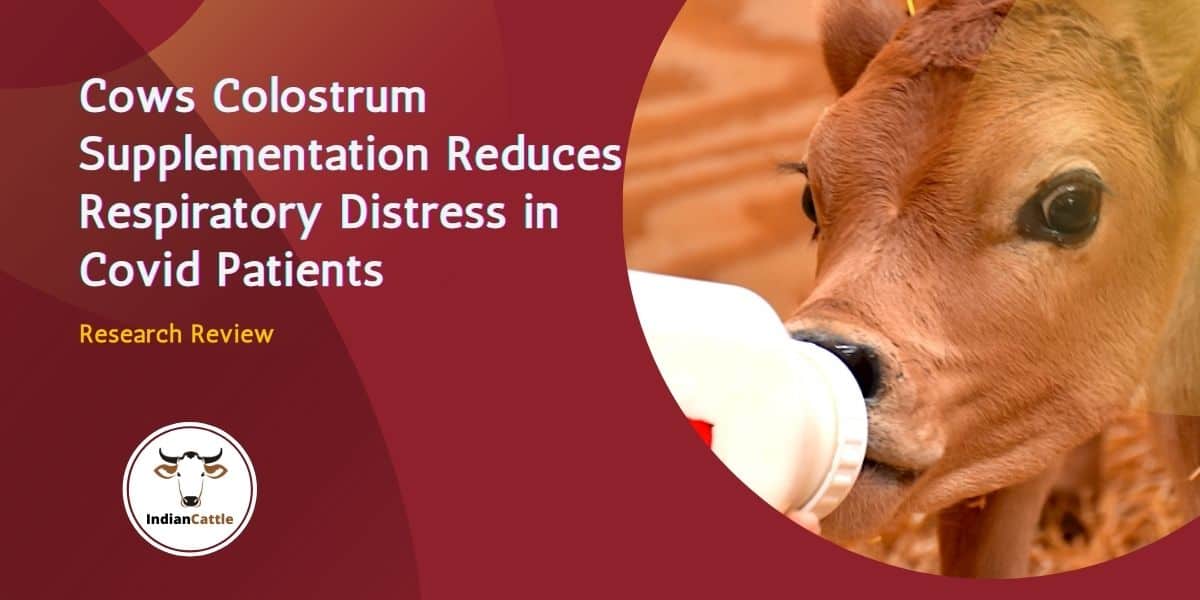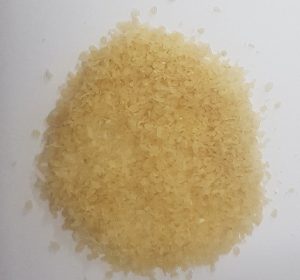
Cow Colostrum Supplementation Reduces Respiratory Distress in Covid Patients – Research Review
What is Cow Colostrum Supplement?
Milk by cows and buffaloes for 2 days after calving is called colostrum because of different physical and chemical contents. Colostrum is a rich source of antibodies against many pathogens the cow was exposed to during its lifetime, it is regarded as life-saving for newborn calves. If enough colostrum is fed, the calf gets passive immunity for early-life infections. Humans, cows and other animals are exposed to similar pathogens present in the environment, colostrum has been found to be of benefit in preventing/curing diverse infections in human, especially children and old people. Cow/ buffalo colostrum has been used as supportive therapy in many enteric and respiratory infections. The pharmacological effects have been attributed to high contents of immunoglobulins, lactoferrin, IGF1 and TGF-beta. When colostrum is fed, day-old calves can absorb these proteins intact. This miracle happens only once in the lifetime of the calf after which the gut closes to any intact nutrient absorption. But, in adults the bioactive proteins will not be absorbed intact, colostrum use is restricted to control respiratory and gastrointestinal tract infections. Colostrum has been shown to contain antibodies against a number of viruses and bacteria and since coronavirus exposure is common in cows during calfhood, it is generally agreed that colostrum should be of benefit in coronavirus infections.
Bioactive Molecules in Bovine Colostrum
| Immune / Growth Factors | Quantity (Mg/L) |
| Immunoglobulin G1 (IgG1) | 47-50 |
| Immunoglobulin A (IgA) | 3.9-4.2 |
| Immunoglobulin M (IgM) | 4.0-4.2 |
| Lactoferrin | 1-5 |
| Epidermal Growth Factors (EGF) | 30-50 |
| Transforming Growth Factors (TGF) | 3.2-8.4 |
| Insulin-like Growth Factors (IGF) | 1-2 |
A recent research report authored by Dr. Swati Khartode published in the ‘Journal of Research in Medical and Dental Sciences’ supports this claim. The trial was on 200 COVID patients admitted in the Vishwaraj Hospital, Pune. One group of patients received cow colostrum twice a day along with the standard treatment recommended and the remaining patients did not receive colostrum. The results showed that the colostrum group patients recovered faster than the control. Few medical practitioners in Pune also tried colostrum in their patients and reported similar results. A striking observation confirmed by the doctors was that when colostrum was given to the COVID patients, the acute respiratory distress, reduced within 1-2 days and the patients’ comfort feel was very high. The colostrum group patients’ hospital stay was also shorter than the control. Since the year 2000, I have been doing research on various aspects of colostrum jointly with Chitale Dairy, and in this blog, I have attempted to describe few classical human clinical trials done globally.
Asthma is a chronic disease in human requiring protracted symptom-based treatment. A randomized, double-blind study with 38 children, aged 7-18 years, who had bronchial asthma and allergic rhinitis, showed that colostrum supplementation for three months significantly reduced nasal symptoms and improved lung function compared to the control. In another study, colostrum supplementation in children and adults @ 50-75 ml daily for a period of two months reported reduced symptoms of allergic rhinitis, sinusitis and enteric infections, even in immuno-compromised people. Several studies have proved efficacy of colostrum in preventing influenza virus infection. In a clinical trial, 144 healthy adults, aged 30-80, were divided into four groups (no prophylaxis; vaccine and colostrum; only colostrum; only vaccinated against the influenza virus). The groups of participants who received either colostrum alone or colostrum plus vaccine had significantly less flu episodes and fewer days with the disease symptoms than groups with no colostrum supplementation. In the same study, the authors observed that end-stage coronary patients or patients with pulmonary hypertension and patients with severe cardiovascular problems registered fewer flu episodes and fewer hospital admissions when supplemented with colostrum compared to the group which only received the vaccine. These results suggest that the use of colostrum can be combined with the annual influenza vaccine in specific patient groups. Bovine colostrum is also a favoured supplement of athletes as it has been found to be effective in maintaining respiratory cell wall integrity. The author in his studies done at the Department of Medicine, Bombay Veterinary College on naturally infected calves and pet dogs found colostrum to be superior over antibiotic in controlling Rota, parvo virus and bacterial diarrhoea and respiratory diseases.
Considering that SARS‑CoV‑2Severe acute respiratory syndrome coronavirus 2 is the virus that causes COVID-19 (coronavirus disease 2019), the respiratory illness responsible for the COVID-19 pandemic affects primarily respiratory and gastrointestinal systems, worldwide research on exploring efficacy of bovine colostrum has gained momentum. Several components of bovine colostrum are being tested for their effects in COVID patients. Researchers recently reported that the major beneficial effect on COVID could be due to lactoferrin as its concentration range from 2.5 mg to 5.0 mg/ml. Lactoferrin has strong antiviral, anti-allergic and anti-inflammatory properties. Preliminary results from an in vitro (in the experimental laboratory) study reported that lactoferrin was effective against the SARS‑CoV‑2Severe acute respiratory syndrome coronavirus 2 is the virus that causes COVID-19 (coronavirus disease 2019), the respiratory illness responsible for the COVID-19 pandemic, Zika and Chikungunya viruses. The effect was attributed to effective modulation of the cytokine storm activation which is responsible for acute respiratory distress syndrome and pulmonary oedema (accumulation of fluid in the lungs). In the Pune trials mentioned above, the reduction of severity of respiratory distress could be attributed to high lactoferrin content in colostrum. Lactoferrin can also prevent infection by inhibiting the SARS-CoV-2 virus from binding to host cells. In a study comprising 75 patients, supplementation of lactoferrin (available as a purified lactoferrin product and not colostrum) led to a reduction in the incidence of dry cough, headache, diarrhoea, improvement in the shortness of breath, muscle pain, tiredness, insomnia and ageusia (loss of taste). The daily lactoferrin dose varied from 256 to 384 mg/day.

In order to study if lactoferrin could prevent COVID in persons exposed to positive patients, a trial was conducted in 256 people. A lower dose of purified lactoferrin was supplemented (128-192 mg/day) and none of them showed COVID symptoms in the follow up period. Extrapolation of the purified lactoferrin findings to whole colostrum suggests that supplementing 50-100 ml of whole colostrum or 5.0 g – 10 g powder / microencapsulated colostrum taken for 15-30 days should give results equivalent to purified -lactoferrin. A recent report in COVID-recovered patients confirmed shedding of virus in faeces well beyond 15 days post-recovery, when no virus could be demonstrated in the nasal swabs. From the virus transmission and spread point of view, this is an important observation since to control outbreaks in the communities it is essential to ensure that recovered persons don’t shed the virus. It is postulated that administering colostrum (specially hyperimmune colostrum) post-recovery for 15-30 days could be a good strategy to ensure that there is no re-infection and shedding of the virus.
Preparing hyperimmune colostrum and milk has been earlier successfully tried at Chitale Dairy. When cows and buffaloes were injected with small doses of viral or bacterial antigens, the colostrum produced by such animals contained exceedingly high levels of specific antibodies. Using the same protocol, we can raise hyper-immune colostrum and milk against SARS-COV-2 if the vaccine used in human is made available. At the Department of Medicine, a novel protocol of purifying IgG1 in large quantities was also developed which can be used for passive immunity transfer as getting immune sera from recovered patients has limitations. I strongly recommend that there is no harm in giving bovine colostrum @ 50-75 ml to COVID patients from day 1 of expression of symptoms.
Manufacturing colostrum powder appears to be commercially unviable because of collection from 1-2 animals from remote locations, maintaining cold chain. Lyophilization which is low-temperature powdering is high energy-dependent and expensive. To address this issue, the author and Dr. Mala Menon from Bombay College of Pharmacy, have developed a low-cost unit to microencapsulate bovine colostrum. The unit can be set up at the village level or big farms to process 200-500 L colostrum per day. The process of microencapsulation employing natural herb-derived polymer provides additional protection to IgG1 and other proteins from the stomach’s hostile acidic and pepsin environment.
You may like to read: Coronavirus Infection in Calves are Different Than Covid-19
